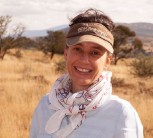Watch carefully to see how a trapdoor spider catches its prey through its trapdoor.
Dr Shannon Brandt, Prof Catherine Sole and video credit: Christian Deschodt
April 8, 2024

Dr Shannon Brandt began doing research at the University of Pretoria (UP) during her honours year in 2017. She received a PhD in 2023.
“I have been doing research at UP for seven years,” she says, “but the three years as an undergraduate student makes it 10 years of academic endeavours at UP.”
Dr Brandt chose to study at UP because of the incredible reputation of the Department of Zoology and Entomology.
“All the researchers there are phenomenal, and they create a great environment for developing independent skills as a researcher.”
As to how her research contributes to the betterment of the world, she says her research at UP in taxonomy, phylogenetics and evolutionary biology is foundational to all other biological research.
“It is vital to understand both the actual number and distribution of species as well as how they got to where they are through evolutionary time. This knowledge allows us to make the best decisions when it comes to conserving the precious biodiversity we have.
“We cannot understand how a taxon got to the present without considering their evolutionary past, and we cannot predict where they will end up if we do not consider their adaptive potential. Both of these facets are paramount if we want to effectively conserve life on our planet.”
Dr Brandt’s current research aims to decipher the role that epigenetic mechanisms play in helping populations of organisms to adapt to local conditions both in their lifetime and trans-generationally.
“This is very important when it comes to long-lived tree species as they cannot ‘migrate’ to better environmental conditions. We want to understand how we can use the tools of selective breeding, assisted migration and possibly genetic engineering to aid these species in adapting to the pressures of climate change.”
Dr Brandt participates in the EpiTree project, which involves multiple French organisations studying the role of epigenetic marks (such as DNA methylation) in the phenotypic plasticity of poplar and oak trees. Her role is to understand population epigenetics within oak trees.
A major highlight in her research career was being published in the journal Zootaxa.
“It was a really nice experience to describe so many interesting new species. Another milestone was getting my PhD and an interesting postdoctoral position in a completely new field in a new place to explore.”
During her postgraduate studies, Dr Brandt says she was privileged to have two incredible supervisors, Professor Catherine Sole and Dr Robin Lyle.
“They are truly inspiring role models for women in science, technology, engineering and mathematics in particular. They produce amazing research while being great teachers and nurturing the talents of their students. They inspired me by demonstrating that you can have it all – you can be a scientist, have a family life, be a great mentor and anything else you want to be.”
In terms of what she hopes to achieve in her research endeavour, Dr Brandt says her main ambition is twofold: “To continually learn and grow by accepting new challenges and never remaining in a comfort zone. The second is to grow the scientific community and add to the knowledge pool. I want to be part of understanding the genetic and evolutionary foundations of species to aid in the conservation of life on our planet.”
She regards curiosity and persistence as the most important qualities in a researcher. Her advice to school learners or undergraduates who are interested in doing research is to find something they are interested in, even if it is not the most charismatic subject matter.
“Ask as many questions as you can, then pursue the answers passionately and persistently. The most mundane things are interesting if you find a different way to look at them and ask the right questions.”
Her hobbies include running, crocheting, drawing and wandering around new places as often as she can.

Professor Catherine Sole's research is driven by the power of molecular techniques in testing evolutionary processes at various levels: population, species and higher taxa with special focus on invertebrates. She aims to find common evolutionary patterns in different taxa that reflect landscape and phylogenetic changes; and linking them to climatic, biogeographic and geological changes.
She is affiliated with the University of Pretoria Forestry and Agricultural Biotechnology Institute (FABI) to which she contributes entomological capacity and expertise.
 Story
Story
Cricket à la king? How about a yellow mealworm burger? Foods that may previously have evoked a ‘yuck’ response are now firmly on the menu. Research into edible insects by the Department of Zoology and Entomology at the University of Pretoria (UP) is exploring how to rear and harvest this food of the future.
 Story
Story
A single query to ChatGPT uses as much electricity as burning a light bulb for about 20 minutes. Multiply that by the millions of requests that this artificial intelligence (AI) chatbot receives each day, and the environmental impact is ominous.
 Story
Story
University of Pretoria (UP) researchers have found that the antioxidant content of certain types of tea can be likened to that found in recommended portions of fruit and vegetables.
Copyright © University of Pretoria 2025. All rights reserved.
Get Social With Us
Download the UP Mobile App